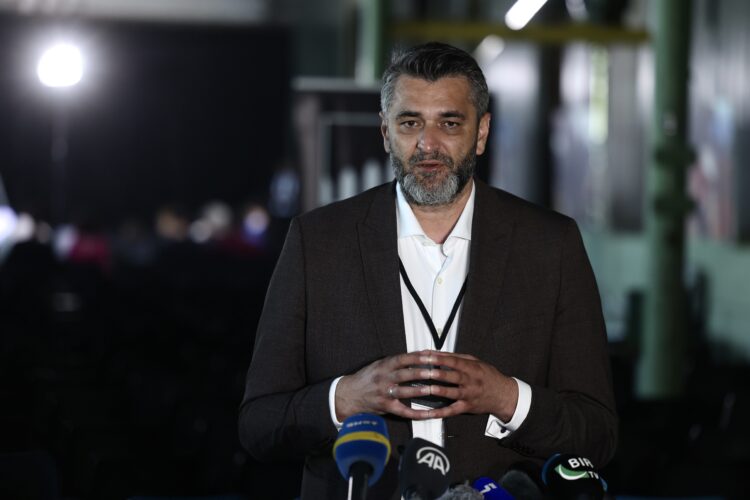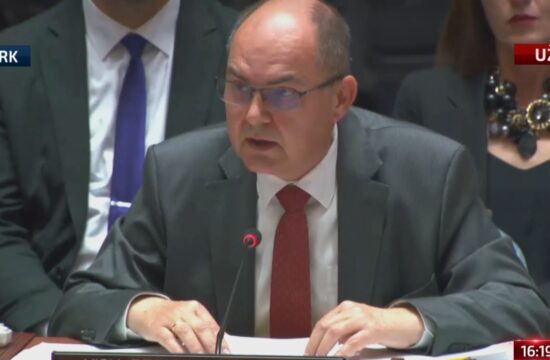
Speaking at a conference and in presence of the Vice President of the World Jewish Congress Menachem Z. Rosensaft ahead of the annual commemoration for the victims of the 1995 Srebrenica Genocide, the director of the Srebrenica Memorial Center, Emir Suljagic, used the opportunity to apologise on behalf of Bosniaks for the crimes members of this ethnic group who served in the 13th Waffen SS Division committed in WWII.
Here is Suljagic's entire speech:
“Ladies and gentlemen, dear friends,
Thank you for being here with us today. Before I turn to the conference itself, allow me to address our friends and allies from the World Jewish Congress. While I hold no official charge, apart from my post as the director of the Srebrenica Memorial Center, I feel deeply compelled, here, and now, to say the following:
Eighty years ago, some among my countrymen joined the ranks in service of German Nazi ideology, bringing harm upon you, your people, and your forebears – your fathers and mothers, grandfathers, and grandmothers. For this, I apologize to you and hope that you may find forgiveness in your hearts.
I do so here, in a place that represents the gravitational center of all our suffering in the twentieth century, for two reasons. Firstly, to show that no history is elegant: all are rutted and tortuous but must be accepted nonetheless in all their imperfection. Secondly, I stand before you on behalf of the descendants, the children and grandchildren, of the generation of Bosniaks that suffered the same fate in the 1990s as befell your ancestors in the 1940s: they were senselessly killed, solely on account of the skin they were born in.
I feel it is my historical duty to deliver this message: those who served the 13th Waffen SS Division or the Ustasha regime of the Independent State of Croatia did not act in the name of our people. Their deeds did not speak for us then, nor do they today. Our country was occupied, our people subjugated and our voices silenced.
If indeed we had any rightful representatives, they would have been the partisans and anti-fascists of Bosnia and Herzegovina – Fadil Jahić, Pašaga Mandžić, and Avdo Humo, among numerous others. Derviš Korkut, who risked his life and that of his family to save the most precious thing a nation can have – the memory of its own identity – spoke on our behalf when he hid the Haggadah from the clutches of the Nazis.
There is more for which I would like to apologize. I would like to apologize for the fact that today in my country, commemorative masses are held for the murderers of Jews during the Holocaust; for the fact that cemeteries are being built for the Home Guards and Ustasha, callously and cynically christened “cemeteries of peace.” I would like to apologize for the fact that the constitution of my country precludes us from having a Jewish president. However, it is ultimately not within my power to issue such apologies. I underscore these grievances only to emphasize the enduring strength of what Hannah Arendt described as “subterranean history.”
The Holocaust is a unique and singular atrocity. I do, however, venture to assert that we in the 1990s heard and witnessed the echo of the Holocaust: in detention camps, rape camps, mass graves, and forcible transfer – in the physical destruction of every trace of our existence in this country.
Thank you, dear friends, for extending your hand and embracing the opportunity to build this bridge between two experiences and two peoples – a bridge of greater significance than all of us collectively.
I would now like to take a moment to address the citizens of Bosnia and Herzegovina.
Thirty years have passed since the beginning of the genocidal attack unleashed upon us as a community and as a people. Thirty years later, we have no guarantee beyond our own will and ability that we will not again be subjected to mass and systematic violence because of who and what we are.
There is no institution, apart from the Srebrenica Memorial Center, that is dedicated to preserving memory, raising awareness, and preventing future atrocities.
Thirty years after the genocide, we are still negotiating the terms under which we can be accepted as Europeans.
Thirty years later, we have yet to resolve our existential imperatives. Thirty years later, when our children are beaten just five kilometers away in Bratunac, they suffer in the name of Srebrenica.
Thirty years later, we are once again adrift.
However, there is still hope. There is still hope so long as we are fighting, and so long as we are fighting, we remain alive. But let us not forget what it is exactly that we are fighting for: for literally every word, every concept, for the right to define our lived experience in the words of our choosing. This is our right, and it is rooted in another: the right to exist.
We are not the first, and regrettably, we will not be the last to have to walk this arduous path. On this path, we must always have the final say. This time history will not repeat itself: I can say with confidence that the 1940s were equally, if not more deadly than the 1990s for the Bosniak people. Today, however, our losses in this period are but a footnote in history. Tens of thousands of our ancestors, their lives and the futures that awaited them – merely a footnote.
We refuse to be a footnote. We refuse to have our experience relegated to the margins of European history. We refuse to live in the shadows of historical silences. For our experience is nothing if not European.
This conference is dedicated to collective memory, which is a painstaking process. It entails the meticulous identification and selection of facts and their rightful placement within history, as close to the truth as humanly possible. What we bring to this process cannot and must not continue to be ignored: our own experiences, our own words, our own images – our historical tapestry.
We are here today to raise our voices. Because to be silent about a crime is the only thing worse than the crime itself. We will not be silent.”




Kakvo je tvoje mišljenje o ovome?
Budi prvi koji će ostaviti komentar!